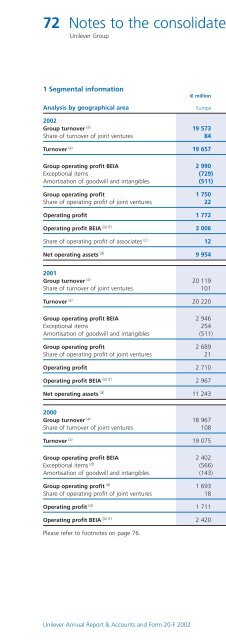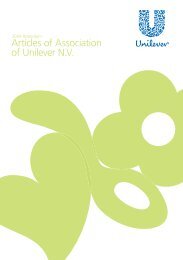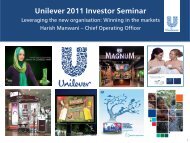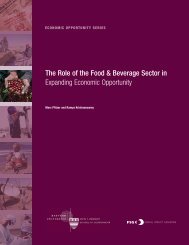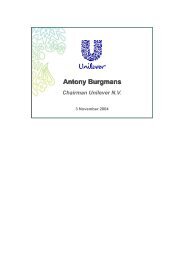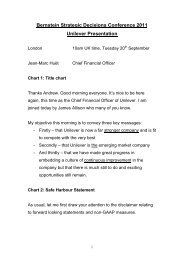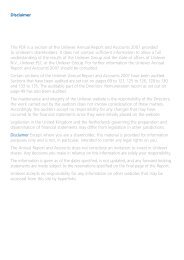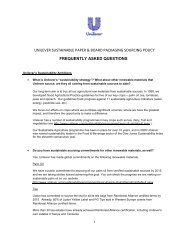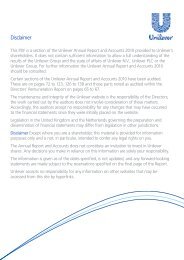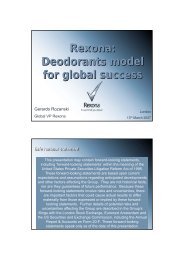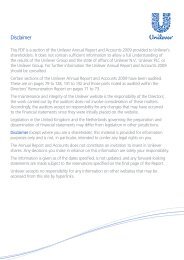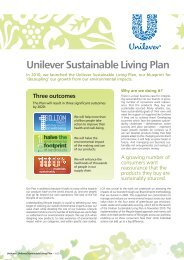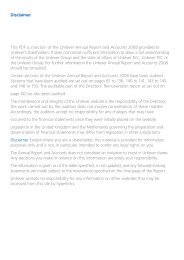Report & accounts 2002 in full - Unilever
Report & accounts 2002 in full - Unilever
Report & accounts 2002 in full - Unilever
You also want an ePaper? Increase the reach of your titles
YUMPU automatically turns print PDFs into web optimized ePapers that Google loves.
The follow<strong>in</strong>g notes are provided for guidance. US residents<br />
should consult their local tax advisers, particularly <strong>in</strong><br />
connection with potential liability to pay US taxes on<br />
disposal, lifetime gift or bequest of their shares:<br />
Netherlands<br />
Taxation on dividends<br />
Dividends of companies <strong>in</strong> the Netherlands are subject<br />
to dividend withhold<strong>in</strong>g tax of 25%. Where a shareholder<br />
is entitled to the benefits of the current Income Tax<br />
Convention (‘the Convention’) concluded on 18 December<br />
1992 between the United States and the Netherlands, when<br />
dividends are paid by NV to:<br />
• a United States resident;<br />
• a corporation organised under the laws of the<br />
United States (or any territory of it) hav<strong>in</strong>g no permanent<br />
establishment <strong>in</strong> the Netherlands of which such shares<br />
form a part of the bus<strong>in</strong>ess property;<br />
• or any other legal person subject to United States Federal<br />
<strong>in</strong>come tax with respect to its worldwide <strong>in</strong>come, hav<strong>in</strong>g<br />
no permanent establishment <strong>in</strong> the Netherlands of which<br />
such shares form a part of the bus<strong>in</strong>ess property;<br />
these dividends qualify for a reduction of Netherlands<br />
withhold<strong>in</strong>g tax on dividends from 25% to 15% (to 5%<br />
if the beneficial owner is a company which directly holds<br />
at least 10% of the vot<strong>in</strong>g power of NV shares and to 0%<br />
if the beneficial owner is a qualified ‘Exempt Organisation’<br />
as def<strong>in</strong>ed <strong>in</strong> Article 36 of the Convention).<br />
The entire dividend (<strong>in</strong>clud<strong>in</strong>g the withheld amount) will<br />
be dividend <strong>in</strong>come to the United States shareholder not<br />
eligible for the dividends received deduction allowed to<br />
corporations. However, the Netherlands withhold<strong>in</strong>g tax will<br />
be treated as a foreign <strong>in</strong>come tax that is eligible for credit<br />
aga<strong>in</strong>st the shareholder’s United States <strong>in</strong>come taxes.<br />
Where a United States resident or corporation has a<br />
permanent establishment <strong>in</strong> the Netherlands, which has<br />
shares <strong>in</strong> NV form<strong>in</strong>g part of its bus<strong>in</strong>ess property,<br />
dividends it receives on those shares are <strong>in</strong>cluded <strong>in</strong> that<br />
establishment’s profit. They are subject to the Netherlands<br />
<strong>in</strong>come tax or corporation tax, as appropriate, and the<br />
Netherlands tax on dividends will generally be applied at the<br />
<strong>full</strong> rate of 25%. This tax will be treated as foreign <strong>in</strong>come<br />
tax eligible for credit aga<strong>in</strong>st the shareholder’s United States<br />
<strong>in</strong>come taxes.<br />
Under a provision of the Netherlands Dividend Tax Act NV<br />
is entitled to a credit (up to a maximum of 3% of the gross<br />
dividend from which dividend tax is withheld) aga<strong>in</strong>st the<br />
amount of dividend tax withheld before remittance to the<br />
Netherlands tax authorities. For dividends paid on or after<br />
1 January 1995, the United States tax authority may take<br />
the position that the Netherlands withhold<strong>in</strong>g tax eligible<br />
for credit should be limited accord<strong>in</strong>gly.<br />
<strong>Unilever</strong> Annual <strong>Report</strong> & Accounts and Form 20-F <strong>2002</strong><br />
Taxation for US residents 145<br />
Under the Convention, qualify<strong>in</strong>g United States<br />
organisations that are generally exempt from United States<br />
taxes and that are constituted and operated exclusively to<br />
adm<strong>in</strong>ister or provide pension, retirement or other employee<br />
benefits may be exempt at source from withhold<strong>in</strong>g tax<br />
on dividends received from a Netherlands corporation.<br />
An agreement published by the US Internal Revenue Service<br />
on 20 April 2000 <strong>in</strong> release IR-INT-2000-9 between the<br />
United States and the Netherlands tax authorities describes<br />
the eligibility of these US organisations for benefits under<br />
the Convention.<br />
A United States trust, company or organisation that is<br />
operated exclusively for religious, charitable, scientific,<br />
educational or public purposes, is now subject to an <strong>in</strong>itial<br />
25% withhold<strong>in</strong>g tax rate. Such an exempt organisation<br />
is entitled to reclaim from the Netherlands Tax Authorities a<br />
refund of the Netherlands dividend tax, if and to the extent<br />
that it is exempt from United States Federal Income Tax and<br />
it would be exempt from tax <strong>in</strong> the Netherlands if it were<br />
organised and carried on all its activities there.<br />
If you are a <strong>Unilever</strong> shareholder resident <strong>in</strong> any country<br />
other than the United States or the Netherlands, any<br />
exemption from, or reduction or refund of, the Netherlands<br />
dividend withhold<strong>in</strong>g tax may be governed by the ‘Tax<br />
Regulation for the K<strong>in</strong>gdom of the Netherlands’ or by the<br />
tax convention, if any, between the Netherlands and your<br />
country of residence.<br />
Taxation on capital ga<strong>in</strong>s<br />
Under the Convention, if you are a United States resident or<br />
corporation and you have capital ga<strong>in</strong>s on the sale of shares<br />
of a Netherlands company, these are generally not subject<br />
to taxation by the Netherlands. An exception to this rule<br />
generally applies if you have a permanent establishment <strong>in</strong><br />
the Netherlands and the capital ga<strong>in</strong> is derived from the<br />
sale of shares which form part of that permanent<br />
establishment’s bus<strong>in</strong>ess property.<br />
Succession duty and gift taxes<br />
Under the Estate and Inheritance Tax Convention between<br />
the United States and the Netherlands of 15 July 1969,<br />
United States <strong>in</strong>dividual residents who are not Dutch citizens<br />
who have shares will generally not be subject to succession<br />
duty <strong>in</strong> the Netherlands on the <strong>in</strong>dividual’s death, unless the<br />
shares are part of the bus<strong>in</strong>ess property of a permanent<br />
establishment situated <strong>in</strong> the Netherlands.<br />
A gift of shares of a Netherlands company by a person who<br />
is not a resident or a deemed resident of the Netherlands is<br />
generally not subject to Netherlands gift tax. A non-resident<br />
Netherlands citizen, however, is still treated as a resident<br />
of the Netherlands for gift tax purposes for ten years and<br />
any other non-resident person for one year after leav<strong>in</strong>g<br />
the Netherlands.<br />
Shareholder <strong>in</strong>formation


